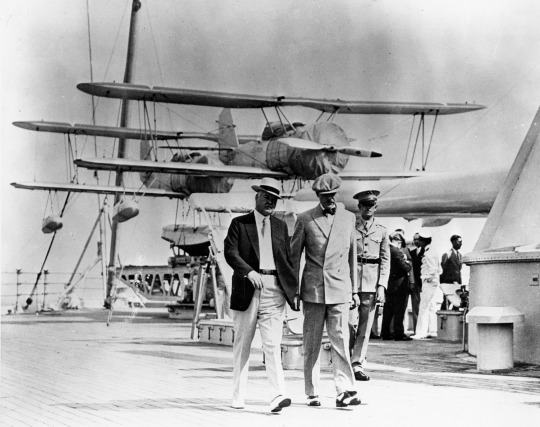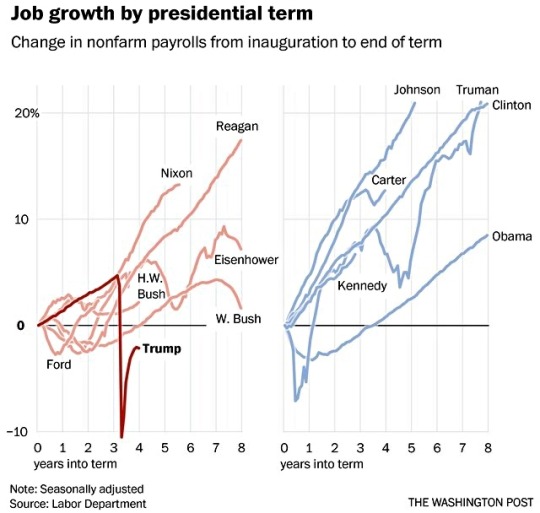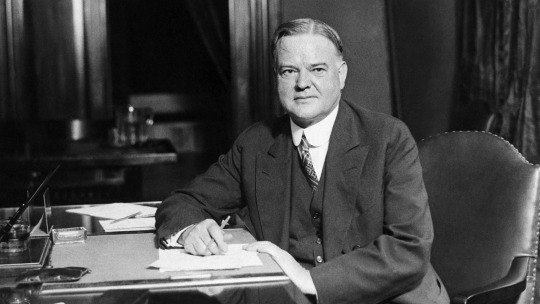#president hoover
Text
In 1919, his work in Europe done, [Herbert] Hoover returned permanently to the United States. He had lived abroad for twenty years and was something of a stranger in his own land, yet he was so revered that he was courted as a potential Presidential candidate by both political parties. It has often been written that Hoover had been away so long that he didn't know whether he was a Republican or a Democrat. That is not actually true. He had joined the Republican Party in 1909. But it is true that he wasn't terrifically political and had never voted in a Presidential election. In March 1921, he joined Warren G. Harding's Cabinet as Secretary of Commerce. After Harding died suddenly in 1923, he continued in the same post under Calvin Coolidge.
Hoover was a diligent and industrious presence in both administrations, but he was dazzlingly short on endearing qualities. His manner was cold, vain, prickly, and snappish. He never thanked subordinates or inquired about their health or happiness. He had no visible capacity for friendliness or warmth. He did not even like shaking hands. Although Coolidge's sense of humor was that of a slightly backward schoolboy -- one of his favorite japes was to ring all the White House servant bells at once, then hide behind the drapes to savor the confusion that followed -- he did at least have one. Hoover had none. One of his closest associates remarked that in thirty years he had never heard Hoover laugh out loud.
Coolidge kept an exceedingly light hand on the tiller of state. He presided over an administration that was, in the words of one observer, "dedicated to inactivity."...By 1927, Coolidge worked no more than about four and a half hours a day -- "a far lighter schedule than most other Presidents, indeed most other people, have followed," as the political scientist Robert E. Gilbert once observed -- and napped much of the rest of the time. "No other President in my time," recalled the White House usher, "ever slept so much." When not napping, he often sat with his feet in an open desk drawer (a lifelong habit) and counted cars passing on Pennsylvania Avenue.
All this left Herbert Hoover in an ideal position to exert himself outside his areas of formal responsibility, and nothing pleased Herbert Hoover more than conquering new administrative territories. He took a hand in everything -- labor disputes, the regulation of radio, the fixing of airline routes, the supervision of foreign loans, the relief of traffic congestion, the distribution of water rights along major rivers, the price of rubber, the implementation of child hygiene regulations, and much else that often seemed only tangentially related to matters of domestic commerce. He became known to his colleagues as the Secretary of Commerce and Undersecretary of Everything Else...
Coolidge didn't like most people, but he seemed especially not to like Hoover. "That man has offered me unsolicited advice for six years, all of it bad!" Coolidge once barked when the subject of Hoover came up. In April 1927, Coolidge puzzled the world by issuing a statement proclaiming that Hoover would never be appointed Secretary of State...Why Coolidge issued the statement at all, and why with such finality, was a matter that puzzled every political commentator in the country. As Hoover had indicated no desire for the role, and the incumbent, Frank B. Kellogg, no inclination to leave it, they were as bewildered as everyone else.
With withering disdain Coolidge referred to his tireless Commerce Secretary as Wonder Boy, but though he sneered, he was glad to have someone to do so much of his work for him....(W)hen the Mississippi flooded as it never had before, it was to Herbert Hoover that President Coolidge turned. One week after making his enigmatic promise not to promote Hoover to the role of Secretary of State, Coolidge appointed him to head the relief efforts to deal with the emergency. Apart from that one act, Coolidge did nothing. He declined to visit the flooded areas. He declined to make any federal funds available or to call a special session of Congress. He declined to make a national radio broadcast appealing for private donations. He declined to provide the humorist Will Rogers with a message of hope and goodwill that Rogers could read out as part of a national broadcast. He declined to supply twelve signed photographs to be auctioned off for the relief of flood victims.
-- The weird relationship between the equally weird Calvin Coolidge and Herbert Hoover, via One Summer: America, 1927 by Bill Bryson (BOOK | KINDLE | AUDIO), courtesy Anchor Books (2014).
#History#Herbert Hoover#Calvin Coolidge#President Hoover#President Coolidge#Coolidge Administration#Harding Administration#Cabinet of Warren G. Harding#Cabinet of Calvin Coolidge#Presidents#Presidential History#Presidential Relationships#Presidential Rivals#Presidential Personalities#One Summer: America 1927#Bill Bryson#Anchor Books#Penguin Random House
21 notes
·
View notes
Text

President Herbert Hoover (left) and Secretary of Navy Charles Adams walking on the aft deck of USS ARIZONA (BB-39).
Note: the Vought 03U Corsairs on catapult.
Date: March 1931
UAL: azu_517_b27_f26_84_26_2_image_m
#USS Arizona (BB-39)#USS Arizona#Pennsylvania Class#Battleship#dreadnought#warship#ship#boat#Vought 03U Corsair#floatplane#March#1931#interwar period#President Hoover#Hoover#Secretary of Navy#united states navy#us navy#navy#usn#u.s. navy#my post
125 notes
·
View notes
Text
*i start to transform*

n-nipahh..! *it's so painful but i smile through it...
a grimace of pain appears on my face as my shell cracks... revealing....*

hnghhh... it was a painful metamorphosis... but now i am in my true form..!!!
#mod rika#mod herbert hoover#herbert hoover#president herbert hoover#united states#president hoover#the great depression#hooverville#rika#rika furude
43 notes
·
View notes
Text
OUR PURITAN ANCESTORS took it as an article of faith that the idle were unworthy of charity, a sentiment famously captured by the Calvinist preacher Cotton Mather: “For those who indulge themselves in idleness, the express command of God unto us is, that we should let them starve.” Long after Mather departed this world, his spirit lived on, embodied in the nation’s poor laws. Statutes that outlined government’s responsibility to the destitute, the poor laws combined guarded concern for needy Americans with suspicions that they were complicit in their own misfortune. Under the poor laws, the chronically jobless were removed from society and dispatched to county poorhouses, catchall institutions that were also home to the old, infirm, and mentally ill. Those who could ordinarily shift for themselves but were temporarily jobless applied to public officials, men with no special welfare training, for what was known as outdoor or home relief, assistance generally given in the form of food and coal. To discourage idlers, the welfare experience was made as unpleasant as possible. Before applying for help, the poor were made to wait until utterly penniless, and then declare it publicly. When granting relief, officers followed the old rule of thumb that families living “on the town” must never reach the comfort level of the poorest independent family. The weekly food allowance was a meager four dollars a week—and less in some areas—regardless of how many people it was supposed to feed. Finally, it was customary to give food and coal on alternate weeks, providing minimal nourishment and warmth, but never both at the same time.
By custom and by law, public relief in the United States had always been a local concern, the responsibility of towns, cities, and counties. By the summer of 1931, however, in communities across the United States the money raised for the jobless had evaporated, while the numbers of people applying for it continued to climb. Still, Hoover remained confident that between private charity and local government, America would find its way out of the job crisis. An announcement from the White House in August made it official: the president was against a federal dole and was not about to support one.
From A Square Meal by Jane Ziegelman and Andrew Coe
#Jane Ziegelman and Andrew Coe#a square meal#dole#the dole#president hoover#hoover#great depression#history#american history
1 note
·
View note
Text
What's a MAGA zombie to do when the economy is not just good but is even improving beyond good?
The Department of Labor's stats for January, released on Friday, showed greater US job growth than expected AND a rise in hourly wages.
The US economy added 353,000 jobs in January, almost twice as many as forecast, in “stunning” figures that led investors to slash expectations for interest rate cut in March. Economists had expected a 180,000 jobs increase for last month, according to an LSEG survey. Tom Simons, US economist at Jefferies, described the figures as “stunning numbers” that left him “near speechless”.
Not only were the January figures strong, but the November and December figures were revised upward based on data still being analyzed.
Friday’s jobs report by the Bureau of Labor Statistics also showed that US workers’ average hourly wages grew 0.6 per cent to $34.55 — up 4.5 per cent over the past 12 months. Revised figures in the report indicated that the US had added 333,000 jobs in December, up from a first estimate of 216,000. The figure for November was also upgraded, by a more moderate 9,000 to 182,000.
Donald Trump once claimed that he created "the greatest economy in the history of the world." Typical Trumpian bullshit from the guy who told over 30,000 documented lies during his term.
Trump was the first president since Herbert "Great Depression" Hoover to leave office with a net loss in the number of American jobs,
In terms of percentage of jobs, Trump looks yet worse. Even G.W. Bush had a tiny increase – being saved by the fact that he left office before most of the effects of his Great Recession kicked in.
This Washington Post chart was published in January 2021.

Some people bizarrely think Republicans are better for the economy - but stats simply don't support that. The Republican economy is probably better for billionaires who got enormous tax breaks from Ronald Reagan, George W. Bush, and Donald Trump.
A second Biden term would probably place him in the same territory as LBJ, Truman, and Bill Clinton for job growth.
#the economy#strong job growth#job creation#joe biden#bidenomics#january 2024 job stats#bureau of labor statistics#democrats#republicans suck at the economy#donald trump#trump is the only president since herbert hoover to leave office with a net job loss#vote blue no matter who#election 2024
17 notes
·
View notes
Text
i wanna stay at the plaza hotel so badddduhhhhhhhhh i am literally abt to start selling n*des
#my eloise moment. my kevin mcallister moment. my president hoover moment#stevenose posts#no kidding i haven’t wanted anything more in my life i’ve dreamed of spending christmas there since i was EIGHTTT
13 notes
·
View notes
Photo

May 1945.
President Truman wrote in his diary:
“FBI is ... dabbling in sex-life scandals and plain blackmail… This must stop.”
16 notes
·
View notes
Text
If you're wondering why Obama is an option,he did constant drone attacks on innocent civilians in other countries so yeah
Feel free to say why you would send them to hell
Though to be fair most of the people on this list are already in hell but you know lets just say you're sending those ones to super hell
#polls#tumblr polls#us president#president#andrew jackson#ronald reagan#george w bush#donald trump#richard nixon#jfk#herbert hoover
28 notes
·
View notes
Text


#Poll#President#Presidents#President of the United States#US President#Presidential Poll#America#Tumblr Poll#Tournament Poll#William Henry Harrison#Herbert Hoover#Note: we do NOT own this artwork
5 notes
·
View notes
Text
Presidential Man Slut Poll Round 1


Vote for who you think has the absolute sluttiest vibes! Learn more at the FAQ. This poll ends on Saturday, 25 February 2023.
Remember to reblog to make sure everyone gets a chance to vote. That’s democracy, babey!!!!
11 notes
·
View notes
Text
#herbert hoover#franklin delano roosevelt#harry s. truman#dwight d. eisenhower#john f. kennedy#lyndon b. johnson#richard nixon#gerald ford#jimmy carter#ronald reagan#us presidents#asking questions
8 notes
·
View notes
Note
Are there any presidents that should have won or should not have won the nobel peace prize?
I think Herbert Hoover should have won a Nobel Peace Prize for the remarkable relief work he did fighting hunger in Europe during World War I and famine in the immediate aftermath of the war and the Bolshevik Revolution in the Soviet Union.
Anyone who has read my blog for more than a few minutes knows my loyalty and support for Barack Obama. I'm as big of a fan of Barack Obama as you will find anywhere. But it did not make sense when he was awarded the Nobel Peace Prize in 2009, and it still doesn't make sense. Even Obama was stunned that he won it. It's always seemed that Obama was awarded the Nobel Peace Prize for not being George W. Bush, and I think there were probably a lot more worthy options for that year's award.
#Nobel Peace Prize#Presidents#History#Nobel Prize#Nobel Laureates#Presidency#Herbert Hoover#President Hoover#Barack Obama#President Obama
20 notes
·
View notes
Text

The crew of USS ARIZONA (BB-39) pose for a photograph with President Hoover (center front).
Date: March, 1931
UAL: azu_517_b17_f19_77_3_303_image_m
#USS Arizona (BB-39)#USS Arizona#Pennsylvania Class#Battleship#dreadnought#warship#ship#boat#March#1931#interwar period#united states navy#us navy#navy#usn#u.s. navy#my post#President Hoover
67 notes
·
View notes
Text
Not featured but g'd I wish I could: Warren Harding, Franklin Pierce, Millard Fillmore, and more. so much more. almost all of them, actually. these are just the ones i know most people regard as specifically awful.
#politics#history#united states history#presidency#ronald reagan#john tyler#james buchanan#herbert hoover#richard nixon#andrew johnson#andrew jackson#donald trump#millard filmore#zachary taylor
3 notes
·
View notes
Photo

“Where Mr. Roosevelt Escaped Assassination,” Border Cities Star. February 17, 1933. Page 20.
---
A GENERAL view of the Miami, Fla. bayfront park where President-elect Franklin D. Roosevelt escaped when an assassin fired into his party Wednesday. This scene was made in 1921 when the city welcomed President Herbert Hoover and similar crowds greeted the president-elect when the shooting took place on Wednesday.
#miami#franklin delano roosevelt#fdr#assassination attempt#political assassinations#joe zangara#herbert hoover#1932 american presidential election#president of the united states#united states history#united states politics#history of crime and punishment#the great depression
2 notes
·
View notes
Text

31st US President Herbert Hoover and his Belgian shepherd dog King Tut, likely taken in 1928 before the November elections. This picture of a smiling Hoover and his furry friend was distributed across the country by the Hoover campaign and improved his public image, helping to propel Hoover to his presidency. The New York Times called this photograph "one of the happiest pictures ever made" of the president.
2 notes
·
View notes